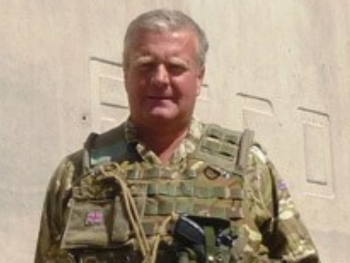University News Last updated 08 August 2023

Armed with a suitcase full of fish skin and minus the modern equipment he regularly used while serving with the British military, Dr Steve Jeffery spent two weeks in 2020 treating dozens of Armenian combat soldiers injured in the war with neighbouring Azerbaijan.
Almost three years on, the burns surgeon and Professor of Wound Study at Birmingham City University (BCU) has been awarded the prestigious Medal of the Prime Minister of Armenia for his outstanding work.
“It was a mass casualty situation in a war zone, so it was a very challenging time,” recalled Dr Jeffery, who is Professor of Wound Study at BCU. “It was a nice surprise and an honour to be recognised for the work I did.”
Dr Jeffery negotiated the testing COVID-19 restrictions in the second half of 2020 to reach the Armenian capital of Yerevan, near the heart of the Nagorno-Karabakh conflict, after travelling via Moscow with his Icelandic colleague Dr Hilmar Kjartansson.
Once they had arrived in the middle of the war zone, they unpacked their precious cargo and began treating the scores of wounded, who had filled up the local military and civilian hospitals.
“There weren’t enough surgeons to treat the injured,” said Dr Jeffery. “If you have 300 people to operate on, you can only operate on one at a time. So you look for ways to speed up that process.”
A veteran of multiple tours, including Afghanistan, Dr Jeffery called one of his contacts to secure a supply of wound pumps, which are capable of draining excess fluid from injuries.
He also started using the fish skin that he and Dr Kjartansson had brought with them.
“It’s a by-product of the fishing industry in Iceland,” said Dr Jeffery, who spent 35 years in the military before retiring and is still an army reservist.
“Turns out the skin of the wild Atlantic cod is a very good dressing. It contains Omega 3 fatty acids, which protect wounds from bacteria, and is also an anti-inflammatory.”
Dr Jeffery did what he could for the time he was in Yerevan.
“We were operating round the clock, 24/7,” he said.
“I was running between hospitals to help. Each one was full of injured soldiers. I had my own operating list and I was training others. At the end of two weeks, they had got the hang of it.”
The fish skin and wound pumps were pivotal.
“They made life easier and enabled us to get through more patients,” said Dr Jeffery.
Almost three years on, Dr Jeffery was invited to lunch in London by the Minister of Labour and Social Affairs, Mr Narek Mkrtchyan, whom he had got to know while in Yerevan.
A short walk to the Armenian Embassy followed, where Dr Jeffery was awarded his medal by Mr Mkrtchyan and Mr Varuzhan Nersesyan, Armenia’s Ambassador to the United Kingdom.
“I was also given a very nice bottle of Armenian brandy,” said Dr Jeffery.
For more information about BCU’s Wound Healing and Tissue Repair MSc, visit the university’s School of Nursing and Midwifery website.